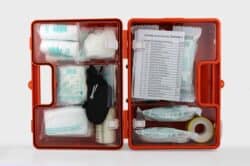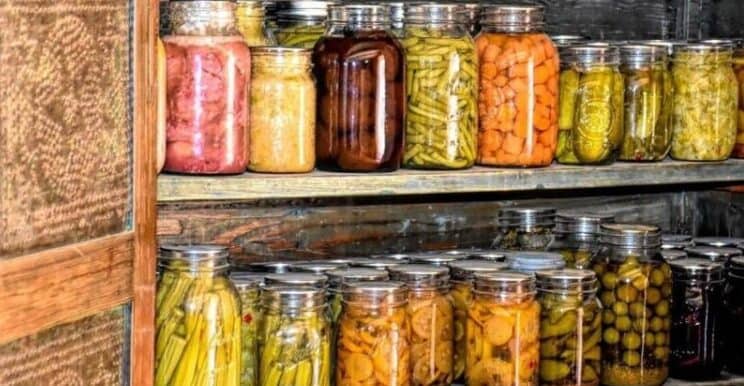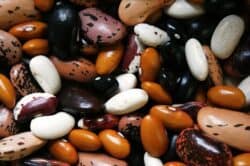How to Prepare for a food shortage. The thought of needing emergency food shortage is scary. Today, millions of immigrants pouring into the country and receiving government aid puts a greater strain on our food supply. There is a coming food shortage, and it is wise to start prepping to ensure our families have enough to eat. If you had a parent who lived through the Depression era, you would probably know how to make a meal from virtually nothing, which is a great skill. These days may be coming back again. Be prepared.
TABLE OF CONTENTS
Coming Food Shortage in 2022
The government’s incompetency in handling a possible food supply chain issue, along with the country’s massive destruction of food processing plants & fertilizer & grain shortages, will lead to empty shelves at the local supermarkets and stores. But anything can happen.
Multiple planes crashed, and a curious string of fires have destroyed dozens of food processing units (plants) across four states within the last few months, aggravating an escalating supply chain and inflation crisis throughout the U.S.
US Food Shortages
Among the most recent incidents, the sudden unfortunate destruction of Azure Standard’s Oregon-based joint headquarters & warehouse facilities on April 18 has drawn much attention and created chaos within the States. This is just one incident.
Dozens of fires have occurred at different food processing units, impacting the country’s supply of beef & poultry. The fires began to show regularly in the news and have created a lot of stress on the supply chain. Analysts have started speculating that this destruction of food processing units will affect market prices and lead to food shortages.
Thousands of cattle died from the heat, and thousands of chickens died in fires. And thousands of ducks die in a barn fire. Are these farmers have a string of bad luck, or is something more sinister afoot? Whatever is doing, we need to prepare for the worst food shortage in USA history.
This article has mentioned multiple ways to prepare for possible global food shortages. Preparation is the key to deal with it with whatever comes our way.
25 Ways to Prepare for Food Shortages
To prepare for possible food grocery store food shortages and survive, one needs to identify the potential risks in your respective area. First, you want to inventory your current food and water resources. Next, you need to develop a food shortage plan. For example, you preserve your food, start gardening, etc.
Whether America will run out of food, you and your family need to be safe and survive. Following is the list of 25 ways that can help you survive the upcoming global food shortage issue:
1. Buy Survival Foods
Survival food doesn’t need refrigeration or special storage. Survival foods are also prepared to last up to ten years. These foods include energy bars, packaged products, cookies, all-in-one meals, canned meat, grains, frozen foods, crackers, etc. Whatever survival food you buy should be able to satisfy your daily need for nutrition.
2. Stock up on Canned Foods
Canned products are a great savior during a crisis. Meats can keep in the freezer for almost six months. Above all, while buying any canned meat or vegetable product, ensure the product offers a good shelf life to help you last longer. You should consider purchasing canned foods with a shelf life of one year to help you and your family survive, even if the food shortage extends for an extended period. If you have a restrictive diet, stock up on low salt—diabetic and gluten-free foods.
3. Store up on Baby Food and Other Baby Essentials
If you have babies, make sure you stock up on baby foods and formula milk in ample amounts. Also, make sure to have a food processor to make your baby food if necessary. No matter what comes in, your baby should get a daily source of nutrients.
When there is a supply chain issue in the country, you might not get baby essentials like diapers, wipes, and baby skincare products in your local supermarket or online. Local food banks and charities can also get free diapers and wipes.
4. Don’t Forget Pet Food
You can forget one of your family’s most important members of your pets. Ensure you have plenty of wet and dry cat and dog food for a few months. This way, you won’t have to give food meant for your family to your pets. Find out where to get free pet food near you.
5. Store Juice
Food and water might get stuck in tankers offshore due to supply chain issues. Stock up on water, fruit, and vegetable juices to keep yourself hydrated during tough times. Additionally, if food supplies get low, you can fast one or two meals using juice.
6. Stock up on Toiletries
Essential toiletries like soap, paper, powder, toothpaste, deodorant, and sanitary products should be available at your home.
7. Know how to Filter Water
Only storing ample water won’t be enough. Know how to purify outside water sources, such as rainwater. You can purchase water purification tablets on Amazon. In the first step, you need to clean & sanitize storage containers. You must be careful about which container you choose to keep the water germ-free for a long time.
8. Eat Less Meat
Meat does not need to be the main item on your plate. During a crisis food shortage, be prepared to eat less meat and rely more on dried food products. That is to say, Meat, fish, and poultry are the most important food items affected by supply chain issues. Eating less meat will help your family save money.
9. Start a Vegetable Garden
Vegetable gardening is one of the best things you can do to survive a food crisis. For example, if you don’t have a backyard, grow vegetables on your patio. So even if the prices of vegetables increase during a food crisis, it won’t affect you. Beans, peas, radishes, tomatoes, kale, and can all be grown in small spaces. If you have a backyard or patio, you can grow a garden.
10. Plant Perennial Vegetables
Perennial vegetables return year without having to replant them. Examples are asparagus, broccoli, rhubarb, spinach, sweet potato, blueberries, raspberries, strawberries, etc.
11. Start a Backyard Orchard
You can purchase miniature fruit trees for as little as 25 dollars. If you have a very small plot of land, purchase mini varieties. Additionally, some trees can be grown in large pots. Plant trees that produce fruit quickly. Peach trees bloom very quickly: peach, apple, apricot, pear, cherry, fig trees, etc. Importantly, make sure to get the self-pollinating variety. In no time, you will have enough for family, friends, and canning.
12. Keep a Supply of Seeds
Inside each seed is the potential food for your family. Buy first-generation non-GMO seeds from a reputable seed dealer.
13. Store Dry Bulk Staples – Grade Plastic Buckets
To prevent your food supply from being eaten or contaminated, always store them in rodent & insect-proof containers to preserve the edibility of your foods. Food grand plastic buckets can be purchased on Amazon and big box stores.
14. Get a Solar Generator
Survival foods and canned foods do not need to be refrigerated. But meats and other items require refrigeration. The solar generator will benefit significantly if there is an electricity failure in your area. Also, you don’t need gas or propane to run one. That is to say, you can get gas, propane, or a solar generator. It is your choice.
15. Buy in Bulk
Next time you visit a local supermarket, buy dry and frozen foods in bulk. This will help you get promotions, discounts, and coupons. If you can’t buy bulk, pick up a few extra cans every time you shop. You will find, week after week, that the food will add up.
16. Buy Dried Foods
Dried foods like chips, biscuits, cookies, flour, rice, sugar, pasta, beans, powdered milk, peanut butter, nachos, and cereals should always be in your kitchen. These foods last long as long as they are in their original form. They will keep them for at least a year. Dried beans last indefinitely and are a great source of protein.
17. Find a Partner to Barter
Have a trusted friend or family member willing to barter with you to acquire items you may not have. None of us can make it alone. Establishing relationships with people you can trust in hard times is wise.
18. Preserve Foods by Freeze-Drying
Freeze drying is placing a frozen food packet under a vacuum remove all water from it. This helps to keep vegetables and meats stay fresh.
19. Stock your Freezer
Your freezer should be packed with meat and frozen vegetables so that it won’t affect you or your family, even if there is inflation in the market. Make sure you have a backup electrical system, such as a generator.
20. Buy Extra or Elderly or Disabled Family and Friends
Prepare to help others who may be unable to buy extra food themselves. Elderly people without children or family may need your support. Try to be a good neighbor.
21. Have a supply of Vitamins and Medication
Buy vitamin supplements and other necessary medicines to build your immunity and stay healthy and fit despite a food crisis in the country. 15 Programs that Give Away Free Groceries. There might be shortages of drugs if the supply chain gets disrupted. So prepare yourself for every possible situation.
22. Be prepared to Cook Outside or In the Fireplace
During a crisis in the country, the gas and electricity supply might go off. In that case, you need to find an alternative means of cooking and heating your home. Cast iron pans are the best cooking utensil on an open flame.
23. Hunting as a Necessary Skill
Hunting is one of the best ways to feed your family as a food source during a food shortage. You may have hunted as a kid but got away from it as you got older. Brush up on your hunting skills, or learn to hunt small game. Hunting is a perishable skill. Always brush up on gun safety by taking gun safety classes, and practice your skills.
24. Have a First Aid Kit on Hand
Always have a first aid kit at home for emergencies if you cannot get to a hospital and if you can disinfect and treat wounds to prevent infection. Your kit should include
Cloves, Ginger are alternative ways to treat pain.
25. Be prepared to Protect your Home and Family
Your main objective is to protect your home and family to ensure all the provisions you have set aside are not stolen. Whatever that means for you. Be prepared.
Though a food shortage looks possible shortly, we will have enough food for years if lucky. However, it is better to always stay prepared for every emergency. As the famous quote by Desiderius Erasmus says, “Prevention is better than cure.”
Finally
Of course, everyone can not just go out and purchase what they need to stock up for a food shortage. But get creative. Take on an extra shift at work, and buy an extra two or three cans of food every time you shop. You can even prepare your food and can it. Home-canned meat and vegetables can last from 2 to 5 years. Read our 25 steps, and use the ones that seem reasonable to you.











